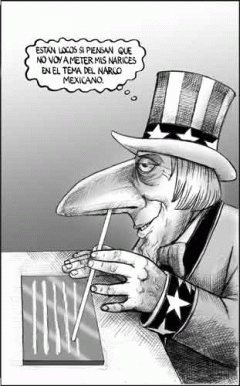
UNCLE SAM SAYS: 'THEY'RE
NUTS IF THEY
THINK I WON'T STICK MY NOSE INTO THE
ISSUE OF MEXICAN DRUG TRAFFICKING'
[La
Jornada, Mexico]
La Tercera, Chile
Mexico's Drug War: No Way Out But to Fight On
"Drug
trafficking in Mexico has existed for decades, but it didn't seriously affect
the stability of the country or provoke conflicts with the United States until
the mid-1980s … By then, Mexican police institutions were in a state of
decomposition, making them fertile ground for the corrupting activities of the
narcos."
By Jorge Chabat
Translated By Paula van de Werken
March 13, 2009
Chile - La Tercera
- Original Article (Spanish)
|

|
|
Mexico: A state in decomposition, from the Christian Science Monitor. [Click for larger version].
BBC NEWS VIDEO: A Massive
crackdown across the United States against the Mexican drug cartels nets 750
people, $59 million in cash, 149 vehicles, three aircraft, three ships,
16,000 pounds of pot, 12,000 kilos of cocaine and over a million Ecstasy
pills, Feb. 25, 00:00:50 
BBC NEWS VIDEO: Eight Mexican soldiers decapitated by drug
gangs, Dec. 23, 2008, 00:01:26 
|
|
|
Drug trafficking in Mexico has
existed for decades, but it didn't seriously affect the stability of the
country or provoke conflicts with the United States until the mid-1980s, when
Colombian cocaine began to cross in great quantities from Mexico to their
neighbor up north. By then, Mexican police institutions were in a state of
decomposition, making them fertile ground for the corrupting activities of the
narcos.
Posted
by WORLDMEETS.US
The dismantling of the Medellin
and Cali cartels in Colombia during the 1990s created a vacuum that was filled
by the Mexican cartels, but the level of drug-related violence in Mexico remained
relatively low. This “peace of the traffickers” can be understood by the policy
of tolerance of the Mexican government, which sought a degree of balance
between the drug cartels and the state, in terms of the routes and the
territories infiltrated by those groups.
That continued into this
century, when President Vicente Fox ordered an energetic crackdown on drug
trafficking. But to the extent that the drug lords were being arrested, the balance
of power between the cartels was destroyed, stetting the stage for a war
between the Sinaloa and Gulf cartels - the two largest - which has generated an
enormous level of violence as well as sour protests from the United States due
to the effects of battling the drug traffickers along the border.
When President Felipe Calderon
took office in 2006 he inherited growing violence in which drug traffickers
controlled sections of the county. With the support of the Army, he responded by
launching a frontal assault against the cartels. Calderon’s offensive has
increased his popularity but has also triggered a new rise in violence: the
drug gangs not only confronted the government, but also began a settling of
accounts among themselves. Last year more than 5,000 people were assassinated
by organized crime - more than double the figure for 2007.
But the violence has now become
more crude. Since 2007, many of the victims of the cartels have been
decapitated - a tactic which is clearly intended to intimidate their enemies.
And as the grotesque violence has increased, so has pressure to adopt a more effective
strategy. Some even suggest a return to Fox's previous policy of tolerance.
SEE ALSO ON THIS:
Excelsior, Mexico:
How Mexico Could Legalize Pot - Whether U.S. Likes it or Not
Excelsior, Mexico:
Relations Between U.S. and Mexico are Deteriorating
La Tercera, Chile
Mexico's Drug War: No Way Out But to Fight On
Semana, Colombia:
Michael Phelps and American Hypocricy on the Use of Drugs
Obviously, most of the
victims are drug traffickers, but the rampant violence that exists in the
country has created a climate of insecurity that affects the everyday lives of
many Mexicans, and in the end, may turn public opinion against Calderon’s
policies. This is something that some of the drug-trafficking groups are
promoting with anonymous posters and the staging of public protests demanding
that the Army return to the barracks in northern Mexico.
Nevertheless, at least in the
short run, it seems that there is no alternative Calderon’s strategy. After all,
while his policy of confrontation has generated high levels of violence, it was
tolerance for the drug cartels that corrupted the institutions of the State in
the first place, sowing the seeds of the current situation.
It seems that the government's
only option is to continue the war, hoping that its long-term efforts to
strengthen the capacity and integrity of state institutions bare fruit.
Corruption - especially within the anti-narcotics forces - remains a serious
and persistent threat.
CLICK HERE FOR SPANISH VERSION
[Posted
by WORLDMEETS.US March 16, 11:37pm]